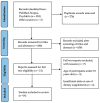Global Dietary and Herbal Supplement Use during COVID-19-A Scoping Review
- PMID: 36771480
- PMCID: PMC9920285
- DOI: 10.3390/nu15030771
Global Dietary and Herbal Supplement Use during COVID-19-A Scoping Review
Abstract
During the first year of the COVID-19 pandemic, the lack of cure and the intensity of the global spread raised a common awareness of health. The aim of this scoping review is to summarize dietary supplement use globally during first two years of the COVID-19 pandemic. A systematic search was conducted in December 2021 following PRISMA guidelines. PubMed, ERIC, and Scopus databases were searched, and 956 results were screened for eligibility. Fourteen cross-sectional studies from 11 countries and 3 continents were examined. All studies were large population surveys investigating healthy eating and supplement use during COVID-19. Vitamin C, vitamin D, zinc and multivitamins were the most widely reported, as well as natural/herbal products such as ginger and honey. The most common reason cited for supplements use was to strengthen immune system and to prevent infection of COVID-19. These studies reported that populations are relying on healthcare providers, family, friends, and social media to learn about supplement use. Future studies on the treatment of COVID-19 should include more evidence for supplement use.
Keywords: COVID-19; dietary supplements; herbal supplements; lockdown; review; scoping review; supplements.
Conflict of interest statement
The authors declare no conflict of interest. The funders had no role in the design of the study; in the collection, analyses, or interpretation of data; in the writing of the manuscript, or in the decision to publish the results.
Figures
References
-
- Office of Dietary Supplements Dietary Supplements in the Time of COVID-19. [(accessed on 12 April 2022)]; Available online: https://ods.od.nih.gov/factsheets/COVID19-HealthProfessional/
-
- U.S. Food and Drug Administration FDA 101: Dietary Supplements. [(accessed on 12 April 2022)]; Available online: https://www.fda.gov/consumers/consumer-updates/fda-101-dietary-supplements.
Publication types
MeSH terms
Substances
Grants and funding
LinkOut - more resources
Full Text Sources
Medical


